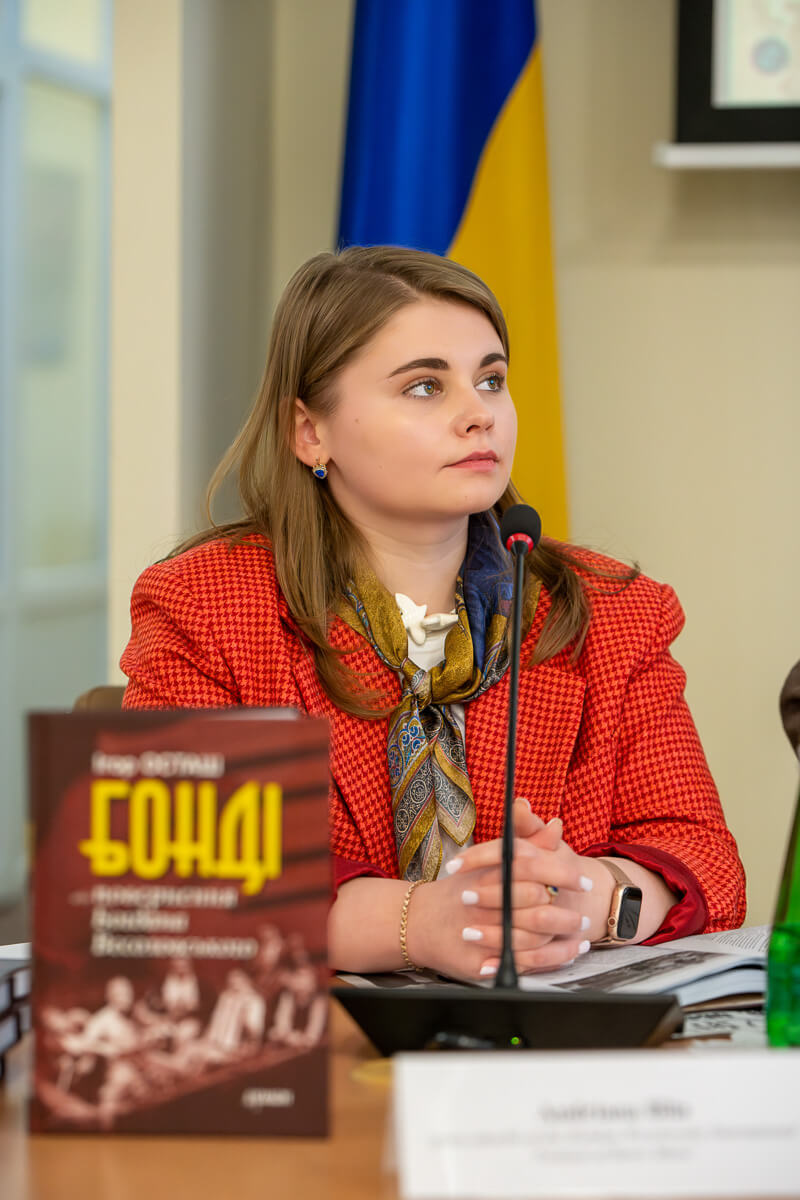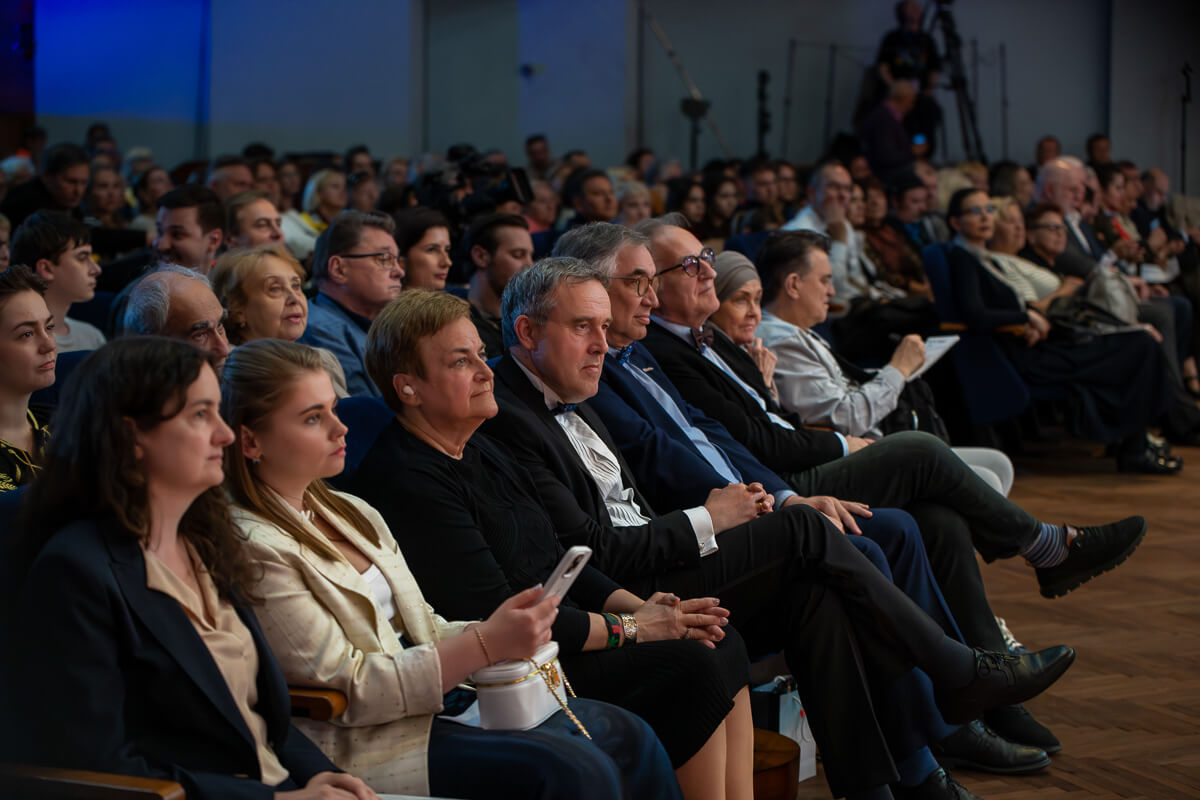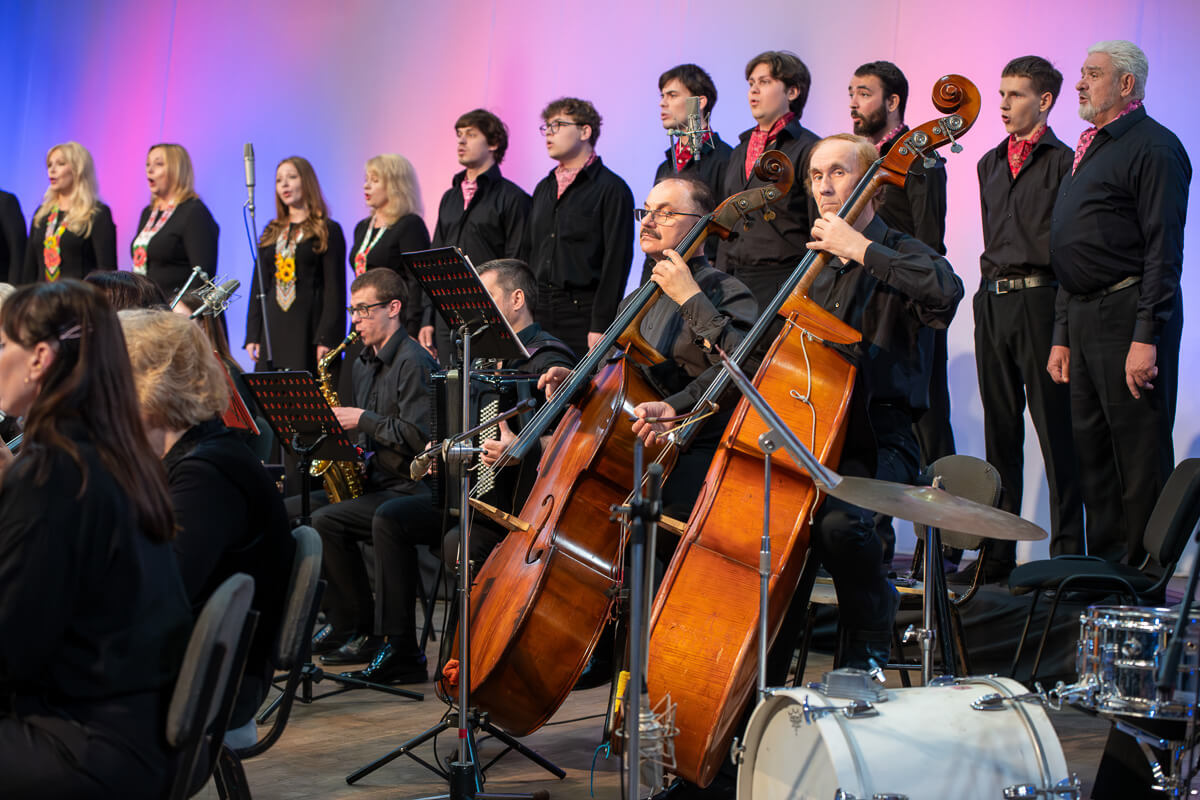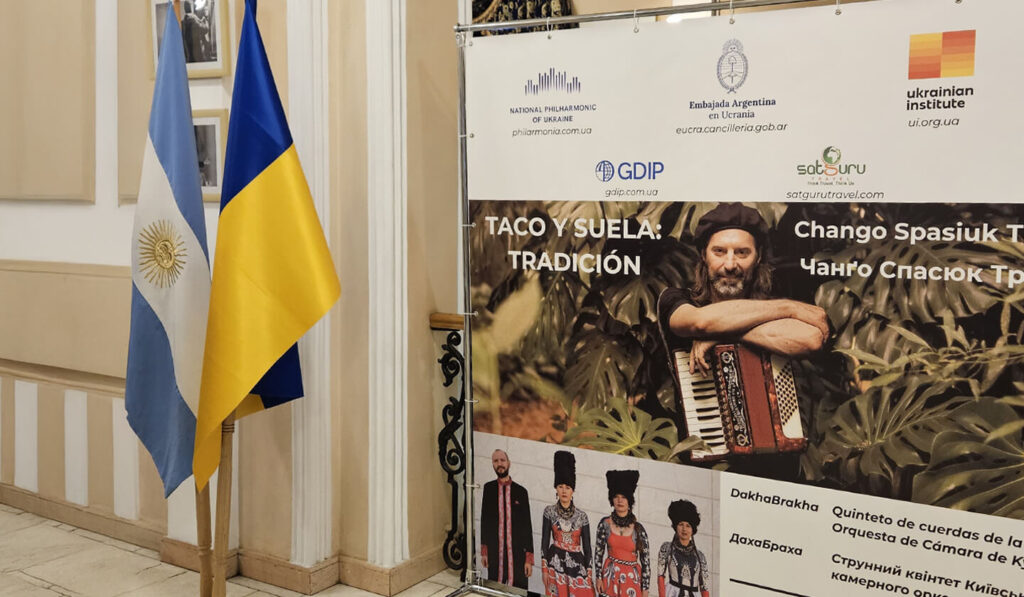On Friday, 13 June 2025, two cultural events took place under the Seventh Bohdan Wesolowsky International Festival of Retro Music: The presentation of the second edition of the book Bondi or Returning of Bohdan Wesolowsky by Ambassador Extraordinary and Plenipotentiary Ihor Ostash at the Media Center of the State Enterprise ‘Directorate-General for Rendering Services to Diplomatic Missions’; and the concert Retro Music: Ukrainian Ornaments at the Recording House of Radio Ukraine. The events were timed to the 110th anniversary of the birth of Bohdan Wesolowsky.
Bondi is the nickname of Bohdan Wesolowsky, a famous Ukrainian composer, the father of Ukrainian dance music, and author of many popular songs (tangos, waltzes, foxtrots), lyric songs, and romances. The book tells the story of his life and creative work. Its readers can immerse themselves in the atmosphere of Ukrainian retro, interwar Lviv and Stryi, DP immigration, and the life of Ukrainians in Austria and Canada.
The second edition’s presentation involved Ukrainian and foreign diplomats, culturologists, and youth. The event began with the introductory speech by the moderator, Andriana Bila, press attaché of the Bohdan Wesolowsky International Festival of Retro Music. She told the audience about the series of events dedicated to commemorating the great composer and popularising his legacy in Ukraine.
Director-General of the GDIP and second-class Envoy Extraordinary and Plenipotentiary Pavlo Kryvonos addressed the author and the guests.
He said, ‘I’m honoured to welcome you to our Media Center for the presentation of a truly unique book. This publication is more than just research; it’s a reclamation of a name, memory, and melody. The author and his team carried out painstaking work, having compiled not only the biography of composer Bohdan Wesolowsky but also a complete picture of an era, fate, culture, and struggle. The foreword to the book includes these words: “We are restoring the historical justice, as Bohdan Wesolowsky belongs to this land; he belongs to Ukraine.” I think this statement may as well be an epigraph to the whole book.’
Mr Kryvonos also told the guests about the fruitful cooperation with Ihor Ostash during the creation of the Century of Ukrainian Music branded calendar and the Diplomacy Without Borders magazine, which included the ambassador’s article about the composer.
The Festival’s visionary and founder, Ambassador Extraordinary and Plenipotentiary Ihor Ostash, spoke about his fascination with the outstanding composer, the parallels in their lifepaths, and the inspiration that helped him write the book and promote the legacy of Bohdan Wesolowsky in Ukraine.
‘Today, we will talk about Bohdan Wesolowsky in the context of cultural diplomacy. To begin, I should mention that the composer spent the last 22 years of his life in Canada, where he obtained his first citizenship in 1956. He never had a Ukrainian passport. He was born in 1915 in Vienna, where his parents had fled from russian occupation. Yet despite those twists of fate, he ended up spending his entire childhood and youth in Ukraine. Bohdan Wesolowsky dreamt of becoming a Ukrainian diplomat, but fate decreed it so he became Ukraine’s cultural ambassador in Canada.’
Mr Ostash drew parallels between the composer’s life and his own, mentioning his work in Stryi, where he began his work on preserving the composer’s memory, his studies in Lviv, and work as Ambassador Extraordinary and Plenipotentiary of Ukraine to Canada, which was the prelude to his subsequent research of Wesolowsky’s musical legacy.
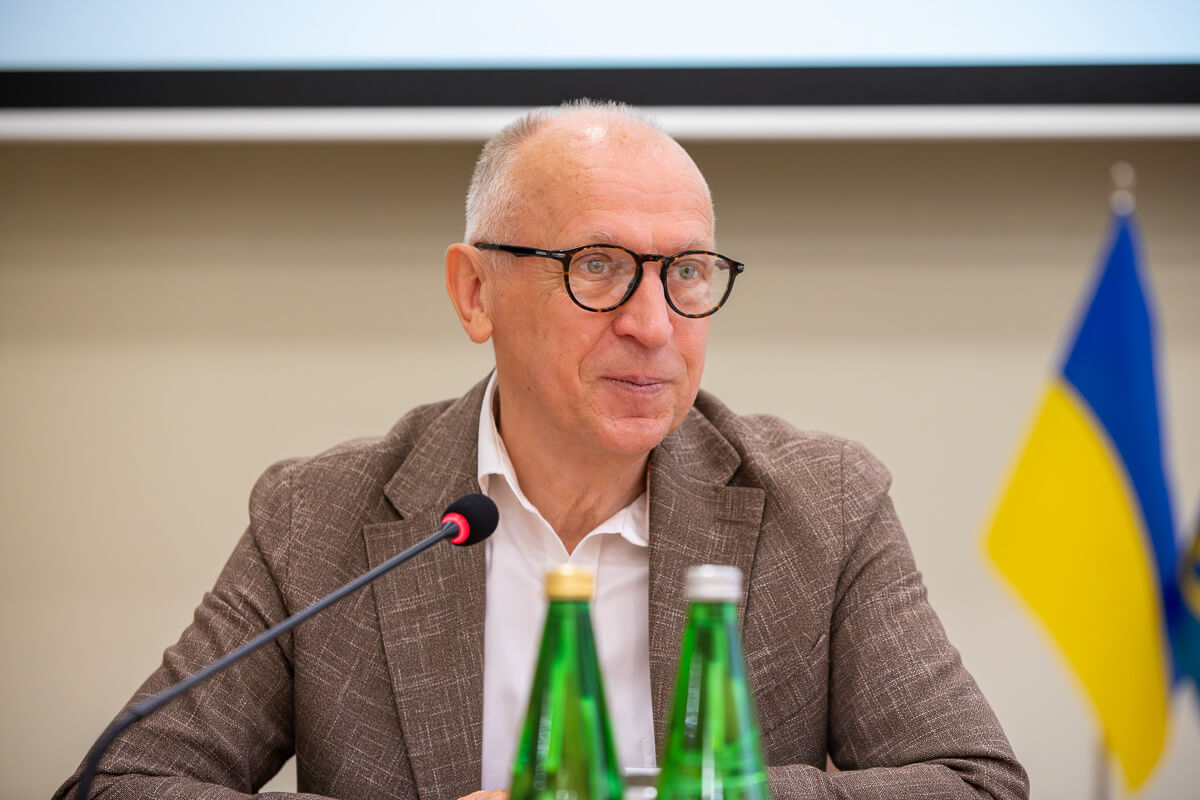
Ihor Ostash elaborated on the Viennese period of the Ukrainian composer’s life, his diplomatic education, the restoration of the diplomatic jazz band tradition, the story behind the creation of the First Jazz film (2025), and the eponymous film adaptation of the Bondi or Returning of Bohdan Wesolowsky book, created by Stanislav Lytvynov, the director of the Bohdan Wesolowsky International Festival of Retro Music, who originally debuted as a director with this film in 2013.
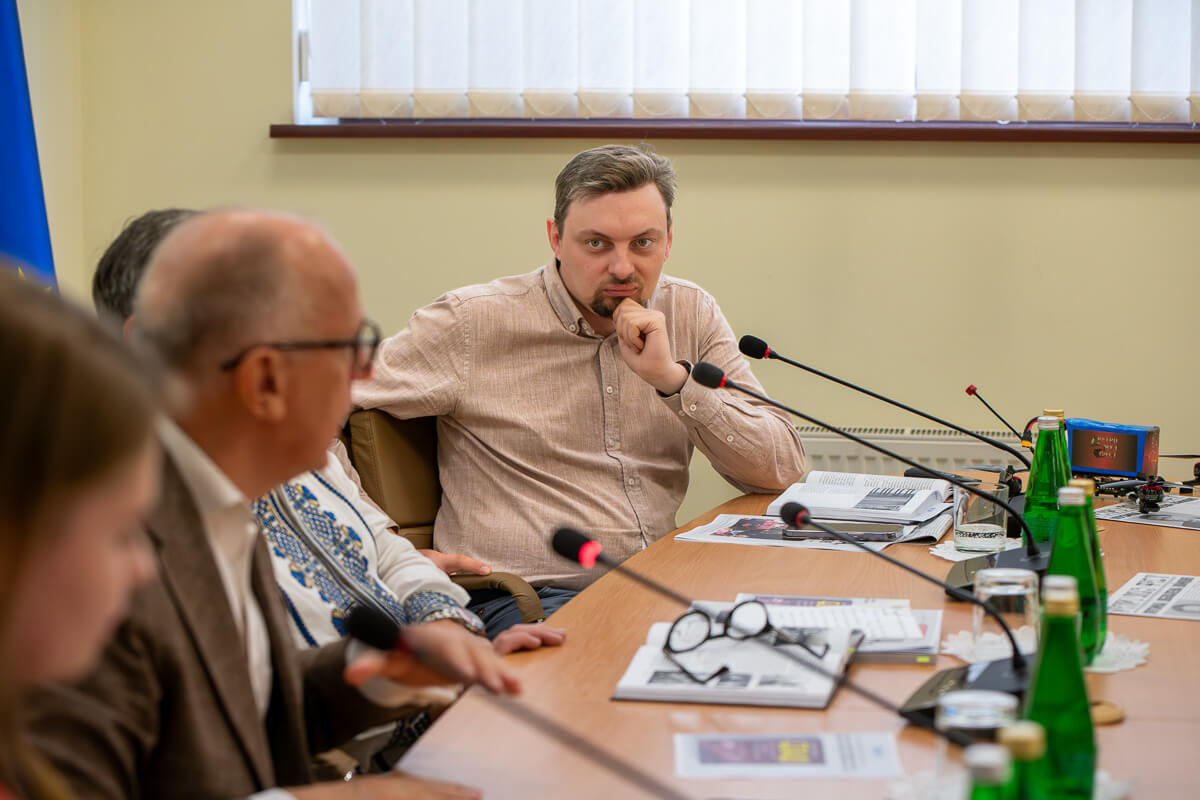
‘I experienced a lot of things for the first time then, including my first film work and first introduction to the concept of cultural diplomacy. I realised that when one wants to make something useful, they can create wonderful things,’ Mr Lytvynov said.
The director spoke in more detail about the filming processes and his original method of using artificial intelligence software to restore the photographs and ‘reanimate’ Bohdan Wesolowsky, allowing the festival’s audience to immerse themselves in the atmosphere of the composer’s era while watching the amazing footage.

The story about the composer’s life was enhanced by the musical accompaniment provided by Tymofii Iliukhin, a student of the Kyiv Conservatory, who performed Wesolowsky’s popular tangos Ty i tvoi chorni ochi [You and Your Black Eyes], Usmikh [Smile], Pryide shche chas [The Time Will Yet Come], and Tykho bez sliv [Quietly Without Words] on a 1930s accordion.
As part of the presentation, Ihor Ostash and his colleagues spoke about their volunteering efforts, including their support for Mykhailo Shelest, a member of the International Festival team who serves in the Aerial Reconnaissance Forces, and showed off the FPV drones that can play Bohdan Wesolowsky’s tango music, which the team assembles and donates to their colleague’s unit.
‘These drones have their own call signs and play music to boost the morale of our Ukrainian military before flying off to the battlefield,’ added Lytvynov.
It bears mentioning that the proceeds from the sale of the second edition of Bondi or Returning of Bohdan Wesolowskyi will also be donated to Mykhailo Shelest’s unit.
Envoy Extraordinary and Plenipotentiary Stanislav Lazebnyk also shared his recollections of Bohdan Wesolowsky’s period of work and his role in Ukrainian musicology and overall culture.
At the end of the presentation, the participants took a group photo.
On the evening of the same day, the Recording House of Radio Ukraine hosted a concert entitled Retro Music: Ukrainian Ornaments, which was dedicated to the 110th anniversary of Bohdan Wesolowsky’s birth. The evening of music was presented by Halyna Babii, a musicologist and Radio Ukraine presenter, and Ihor Ostash, the founder of the Bohdan Wesolowsky International Festival of Retro Music.
The concert began with opening speeches by Ambassador Extraordinary and Plenipotentiary of Canada Nalalka Cmoc and Ambassador Extraordinary and Plenipotentiary of Argentina Elena Leticia Mikusinski.
‘Bohdan Wesolowsky worked at the Ukrainian editorial office of Radio Canada International. All Ukrainian Canadians know about him and respect his creative legacy. His wonderful music played at my home as well. He released an excellent album, Zirka. He was beloved in Canada, Argentina, Australia, the US, and other countries, too,’ shared Natalka Cmoc.

‘It is a true honour to join the commemoration of Bohdan Wesolowsky, a legendary figure of 20th-century Ukrainian music, who is rightly referred to as the king of Ukrainian tango. Born in the barrios of Buenos Aires, tango was nurtured by cultural diversity and the journeys of those who sought new horizons. Over time, it became a universal embodiment of style, elegance, and originality. The fact that the tango has evoked such a deep response in Ukraine and that composer Bohdan Wesolowsky was able to masterfully create his own rendition of it is a testament to the way music acts as an invisible canvas between people and cultures. The composer captured the nostalgic, passionate, and sophisticated spirit of tango, a genre deeply rooted in Argentine identity, and gave it a new sound through the prism of his own cultural language,’ — pointed out Elena Leticia Mikusinski.
The concert featured 16 pieces written by Bohdan Wesolowsky and involved the Academic Orchestra of Folk and Pop Music of Radio Ukraine (artistic director and principal conductor: Mykhailo Pikulskyi); the Radio Ukraine bandura trio: Tetiana Malomuzh, Kateryna Kovryk, Olha Nyshchota; the Blahovist ensemble of soloists (artistic director: Merited Artist of Ukraine Tetiana Kumanovska); soloists: Merited Artist of Ukraine Olena Kumanovska, international contest winner Vladyslava Chaika, international contest winner Ivan Makarov, Yaroslav Dzhus (bandura), Tymofii Iliukhin (accordion); and the Diplomatic Band: Ambassador of Belgium to Ukraine Luc Jacobs, Ambassador of Canada to Ukraine (2014–19) Roman Waschuk, Belgian diplomat of Ukrainian descent Zenon Koval, and Ambassador of Ukraine to Canada (2006–11) and Lebanon (2016–22) Ihor Ostash.

Elena Leticia Mikusinski made a gift specially for the guests of the concert, having invited a pair of dancers, Oksana Drozd and Dmytro Kuiun, who performed tango during the medley Try lvivski tanho [Three Lviv Tangos].
The event also featured a screening of the biographical film Vasyl Bokoch: Sing Me a Tango, directed by Stanislav Lytvynov. For many years, Vasyl Bokoch worked as a soloist at Radio Ukraine. He was the first to perform Bohdan Wesolowski’s songs in Kyiv with the orchestra now known as the Academic Orchestra of Folk and Pop Music of Radio Ukraine. For many years, Vasyl Bokoch was a permanent member of the RetroMuzFest jury panel and participated in the festival’s gala concerts.
At the end of the concert, all the performers, soloists, and musicians played the tango Pryide shche chas [The Time Will Yet Come].


